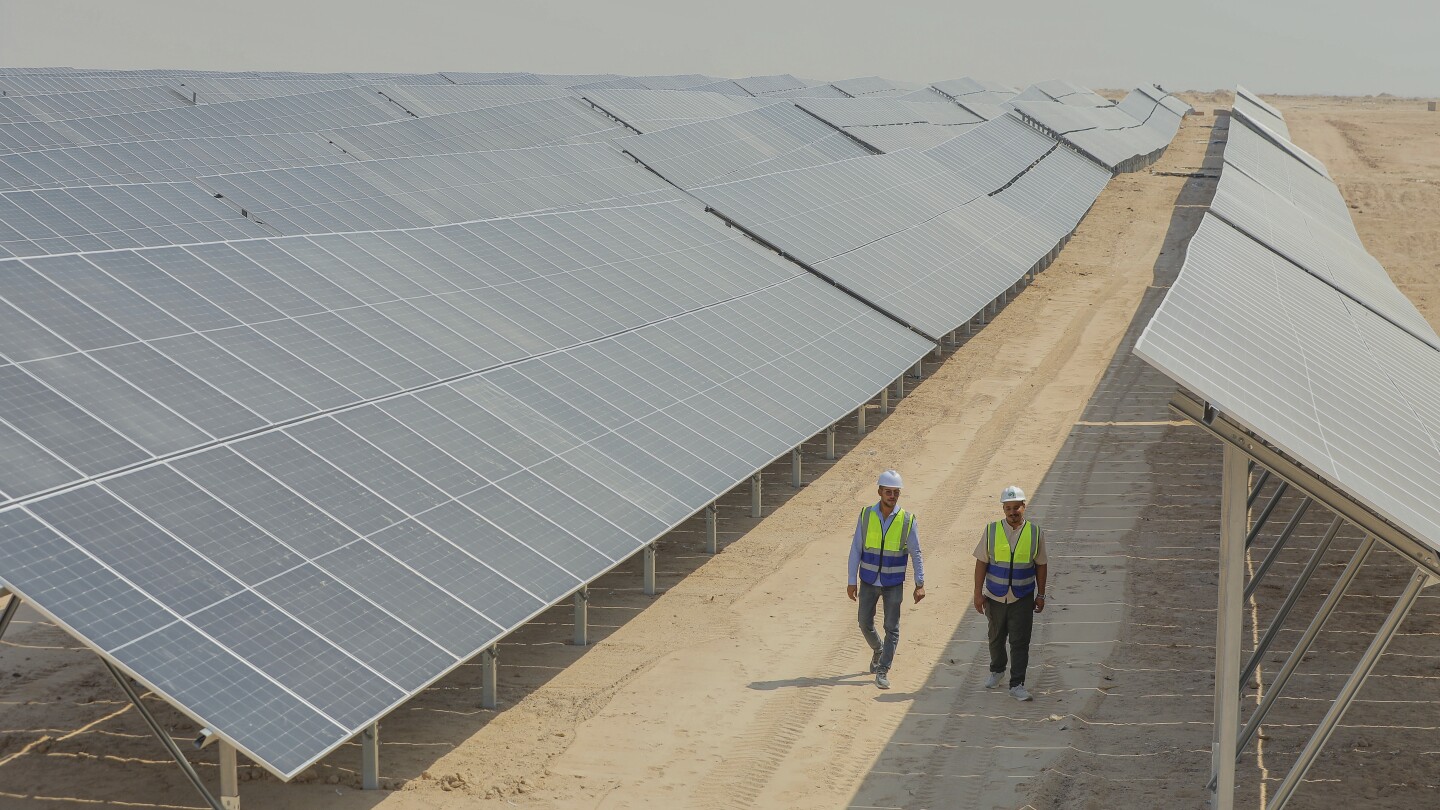KARBALA, Iraq (AP) — Iraq is set to open the country’s first industrial-scale solar plant Sunday in a vast expanse of desert in Karbala province, southwest of Baghdad.
It’s part of a new push by the government to expand renewable energy production in a country that is frequently beset by electricity crises despite being rich in oil and gas.
“This is the first project of its type in Iraq that has this capacity,” said Safaa Hussein, executive director of the new solar plant in Karbala, standing in front of row after row of black panels. From above, the project looks like a black-clad city surrounded by sand.
The plant aims to “supply the national network with electricity, and reduce the fuel consumption especially during the daytime peak load, in addition to reducing the negative environmental impact of gas emissions,” he said.
The newly opened solar plant in Karbala will eventually be able to produce up to 300 megawatts of electricity at its peak, said Nasser Karim al-Sudani, head of the national team for solar energy projects in the Prime Minister’s Office. Another project under construction in Babil province will have a capacity of 225 megawatts, and work will also begin soon on a 1,000 megawatt project in the southern province of Basra, he said.
The newly opened solar plant in Karbala will eventually be able to produce up to 300 megawatts of electricity at its peak, said Nasser Karim al-Sudani, head of the national team for solar energy projects in the Prime Minister’s Office. Another project under construction in Babil province will have a capacity of 225 megawatts, and work will also begin soon on a 1,000 megawatt project in the southern province of Basra, he said.
The projects are part of an ambitious plan to implement large-scale solar power projects in an effort to ease the country’s chronic electricity shortages.
This is cool as heck, for someone who has always lived in very temperate, rainy, cloudy places with long bouts of darkness Solar power generating technology has always been inspiring and exciting… but when I imagine growing up somewhere arid with brutally intense sun being the norm… solar technology must look like alchemy in being able to transform an ever present aspect of your existence into buckets and buckets of electrical power.
I hope that a future for arid places like the Middle East is not far away where there are solar panels everywhere and living in arid places becomes known for living among solar power instead of fossil fuel power.
There is also a direct benefit for Iraq here in that Iraq has historically been a battlefield for empires because of its geography and the behavior of other nations, living as a citizen in a place like this must be exhaustingly difficult from having to grapple with the regional power dynamics always collapsing and being replaced while locals try to just live their lives. The presence of distributed solar generation I think reduces some potential leverage of oppression, it makes it easier for more localized groups to take getting access to electricity into their own hands at whatever scale of governance is most actionable.
The international geopolitics of fossil fuels have dominated countries like Iraq for the past 100 years, but this is something different, this represents a material possibility to construct things more resiliently so they can’t be as easily destroyed for no good reason by countries like mine.
Ooh, sweet! A middle eastern country that Americans can name is making improvements!
Military Industrial Complex: absolutely fucking not
It’s crazy how quickly things can improve when global superpowers aren’t fucking carpet bombing them.
What would it take for countries like this with a surplus of solar energy to export it to other countries? Does that already happen?
This happens already!! As the other commenter mentioned you need transmission lines between the countries, but in more developed parts of the world this is the norm.
One of my favourite websites shows current generation as well as the interconnects between grids: https://app.electricitymaps.com/map/72h/hourly
It would need either a high voltage DC power line between the countries, or the electricity could be used to create hydrogen or ammonia and then ship that. There have been plans to create such power lines, e.g. Xlinks Morocco–UK Power Project (cancelled) and “Desertec 2.0” (very new proposal).
Maybe it will happen in the future, but for now these solar-rich countries probably want to use this energy for themselves.
Maybe they can set up servers for AI companies.




